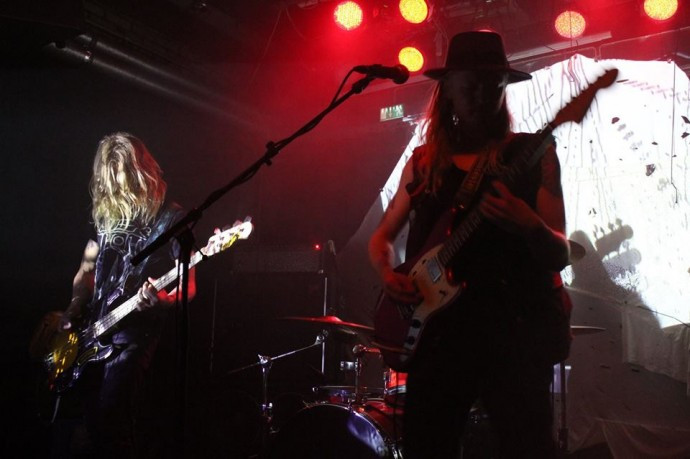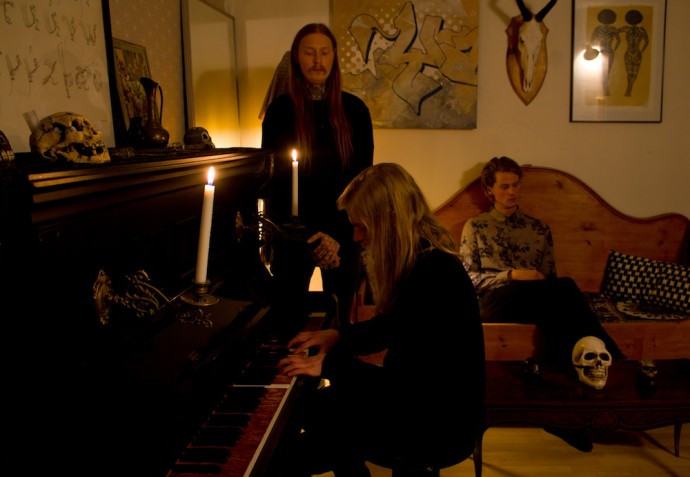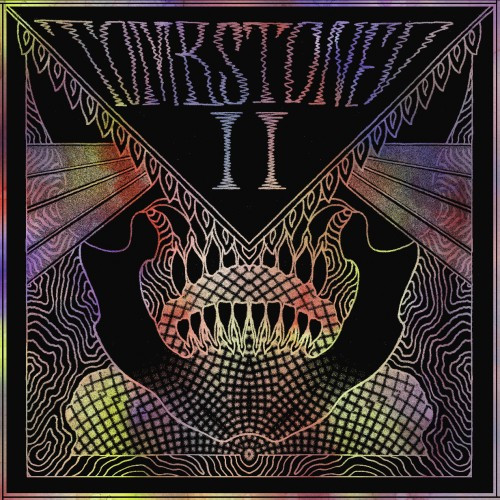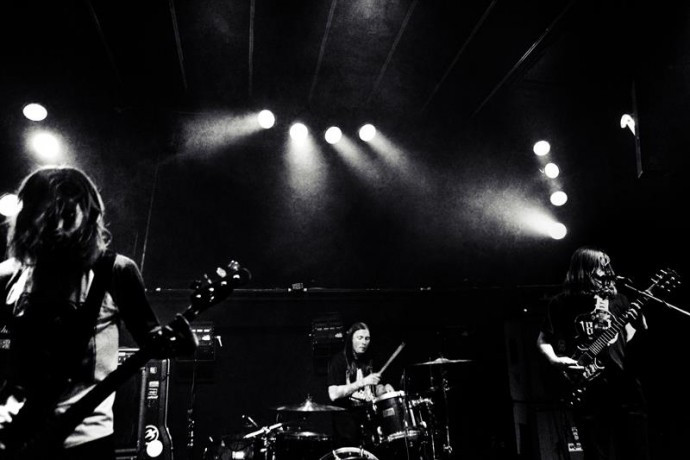(Comrade Aleks rejoins us with an interview of members of the Finnish band Tombstoned, whose new album II is set for release by Svart Records on April 22.)
I was lucky enough to get promo of new Tombstoned album II, which turned out to be a pleasant surprise as I had never heard about them before. Born in 2010, this doom metal outfit (some may add “psychedelic” to this definition) already had an EP Searching/ Let Go (2012) and a self-titled full-length record (2013). The band acts in the form of a power-trio, with Olavi on bass, Jussi on guitars and vocals, and Akke as the drummer.
Their classic doom metal shapes really have psychedelic nuances and a few recognizable features of ‘70s rock music, taking into account that all the instrumental parts are extremely catchy (taste “Pretending to Live” or “Haven’t We Seen All This Before” and you’ll have a general view what Tombstoned are about). Oh, one more thing – good news for those who secretly love The Cure, because sometimes the intonations of Jussi’s vocal parts remind me of Robert James Smith, and that sounds cool!
Enough talk from me! Let’s give space to Jussi and Olavi to tell us how to get Tombstoned.
******
Hail Tombstoned! The band has been active since 2010, but I didn’t hear much about you. How was it all started?
Jussi: A quite classic story. Bunch of friends get together to jam music that they like and see what happens. We still work the same way pretty much.
What was your primary goal when you started Tombstoned? What kind of stuff did you want to play? What kind of sound did you want to gain? And what were your ambitions?
Olavi: I remember being heavily into Black Sabbath at the time. Pentagram and Blue Cheer too, and contemporary bands like Saviours and Witch. That was around 2008/2009. So that’s the kind of sound I had in mind when we started. But then it evolved into something different. I guess it’s a natural progression, you start with a plan and end up somewhere else. And that’s a good thing I think. We take in the influences and then spit out our own interpretation of that mash-up. And that happens with each member of the band, so it’s impossible to guess the outcome. Still, to this day very heavily into Black Sabbath.
I see that you have a stable lineup; there was only one change with the bass player about six years ago. What role did this change play for Tombstoned?
Jussi: Actually there haven’t been any line-up changes. It’s always been Akke, Olavi, and me. Lately we have sometimes been taking our friend Olli to play the organ and synth parts live to make it sound more like the album, but mostly we play as a trio.
Why don’t you make an organ player a part of the constant line-up? I see that the organ perfectly suits your songs.
Olavi: There’s been talks of adding a keyboard player for a long time. There’s definitely big potential there, as far as broadening the sonic landscapes goes. But the problematic part is fitting a fourth musician into a trio. Thats the question — does it flow? As a band we’ve always relied on jamming and the trio dynamic. Improvising with a quartet is very different from a trio. But we’re working on it.
What’s Tombstone’s line-up and how do you share duties between each other?
Olavi: Jussi plays guitar and sings. He writes the lyrics and most of the music. I’ve written some of the songs and I handle bass duties. Akke hits the skins and does the artwork. We come up with riffs and get together and try to make it work, each of us coming up with our own parts.
Tombstoned – Searching
Man, your new album II shows significant development of Tombstoned, considering your debut self-titled record. How do you see these changes from inside of the band?
Jussi: I think it’s just natural development. Who would want to keep on doing the same thing over and over? The songwriting process was also less jam-oriented this time as we were living in different places, so there was usually a strong idea already there when we started to build a new song.
What kind of ideas do you see as strong ones in II?
Olavi: I personally see the album dealing with themes of alienation and depression. Very gloomy stuff and not unlike the first album. It’s a me-against-the-world–situation. When you don’t quite fit in, it can feel like the world is against you. And from that feeling rises a broader fantasy of an all-pervading, behind-the-scenes cult of people running the world and quietly enslaving its population. The fucked up thing is that this fantasy isn’t that far from reality.
Did you set some tasks before yourselves when you started to compose songs for II?
Jussi: Not really. Just trying to make good music. Of course you always want to do a better album than the last one, you know. Develop, keep moving.
Musically, Tombstoned perform a combination of traditional doom metal with some tiny elements of psych, stoner, and even black metal (as in the song “And I Told You”). How do you see the core concept of the band?
Jussi: This album was definitely more slow and doom/stoner-oriented, loud amp and a fuzz type of thing, and psych/space/kraut stuff has definitely had a huge impact on me, so I try to put those influences here and there when it fits. And yeah, who wouldn’t like a bit of black metal sometimes, heh. But there’s no real core concept. The next album might be completely different, or the same style. I don’t know yet.
Tombstoned have a specific and recognizable sound. What are your requirements for it? And how do you get it in studio?
Jussi: It comes very naturally. We work very quickly and spontaneously in the studio. We usually record the basics (as in drums, bass, guitar) live on reel tape and then start adding things. Another guitar, some synth, and then vocals. Space echo, reverb, and distortion from driving it too hard to the desk was the trick for the vocals this time. With drums I completely trust Ilari Larjosto, our engineer, as he is an amazing drummer himself and knows his studio. Bass and guitar sound as they come out from the amp. No magic tricks.
There’s the song with the title “Brainwashed Since Birth”, a good title indeed. What’s this song about?
Jussi: It’s a song about how the money, media, and society are trying to control our minds, and breaking free from that. And the loneliness that you feel when you realize that you don’t fit and don’t even want to fit in this insane system.
Why does this topic disturb you, as Finland seems to be a country where people care about the environment and there are a lot of pure and inspiring landscapes? It looks like you don’t have so much capitalistic shit as other European countries have.
Olavi: There has been a big debate going on concerning the Administration of Forests in Finland. It’s going to be turned into a state-owned company. Keeping in mind the track record of our government for selling state-owned companies to private owners, there’s a real threat that these beautiful Finnish forests might in the future be owned by oversees investment bankers.
How are the lyrics important for you? Is it just an addition to music or do you really seek to communicate with listeners?
Jussi: I usually write them after the song has found its main ideas. It depends from song to song how important they become to me. But I think there is a message in the lyrics that people should pay attention to.
Okay, then what is the story behind the “Time Travel” song? What’s it about?
Olavi: I think it’s a song about the consistency of fascism and the different forms that intolerance and narrow-mindedness manifest themselves with throughout history.
Tombstoned – Last Waltz
With what bands do you usually play gigs? Who’s usually your company?
Jussi: We play with anybody. Big bands, small bands, doom, psych, punk, hardcore, metal, electronic, kraut… Whatever really. Mostly it’s important that we like and know the people of the bands, or then like their music a lot. But we don’t really pay too much attention to keep things the same all the time. It’s stupid to stick to certain genres or bands for credibility or some shit like that. There is music and it can be good or bad. Other things are secondary.
Tombstoned had a brief tour this spring. How was it to try new songs on people? And how did you organize the tour itself?
Olavi: That was actually two shows, so not really a tour hehe… This dude Mika Pokkinen organized the shows. The other one was at Lepakkomies, and that’s always a good time. I think on these dates we just played the new album from start to finish. Jussi had problems with his voice, so the songs were more instrumental and bizarre than what you will hear on record.
Finland has raised a lot of cool doom bands — what are the positive, negative, or simply most inspiring aspects of living there?
Jussi: The Doom probably comes from the long, dark, and yeah doomy winters. It’s heavy for the psyche and you make music to fit the mood. It’s an amazing place in the summer though. But I relocated recently to Berlin at least for some time.
Your country mates Pohjoinen do proper doom stuff with Finnish lyrics, I think it suits well for doom music. Don’t you want to try it too, just as an experiment?
Jussi: I wrote a bunch of stuff in Finnish for a psych-rock project I played in and it was actually very nice. Way more expressive and free than writing in English. I’m not sure about Tombstoned though. Maybe we try, who knows?
https://www.facebook.com/tombstonedhelsinki/
http://tombstoned.bandcamp.com/





I’ve come to learn that Svart is incapable of putting out bad records.
Indeed! I’m wondering if they have any fillers.